What is Iverguard 12 mg?
Iverguard 12 mg is a medication that is used to cure parasitic infections and contains ivermectin. It disables and kills the parasites, helping to effectively relieve conditions such as onchocerciasis, strongyloidiasis, scabies, and lice.
Ivermectin binds to glutamate-gated chloride channels in the nerve and muscle cells of the parasite that results into paralysis and ultimately death of a parasite.
Key Features
| About Iverguard 12 mg |
| Drug Class: Antiparasitic Agents |
| Subclass: Avermectins |
| Product Details | |
|---|---|
| Composition | Active ingredients: Ivermectin Inactive ingredients:
|
| Packaging Type | Blister Pack |
| Pack Size | 10*10 |
| Dosage | 12 mg |
| Therapeutic class | Antiparasitic |
| Action Class | Antiparasitic agent |
| Chemical class | Avermectins |
| Manufacturer | Fortune Healthcare |
| Shelf Life | 2-3 years from the date of manufacturing |
| Usages | Treats various parasitic infections (e.g., Strongyloidiasis, Onchocerciasis, Scabies, and Lice Infestations) |
| Country of Origin | India |
| Storage | Store in a cool, dry place, away from moisture and direct sunlight. |
How does Iverguard 12 mg Work?
Iverguard 12 mg acts by disrupting the parasite’s nervous system, eventually leading to death. It attaches to glutamate-gated chloride channels of the parasite’s nerve and muscle cells, which makes the cell membrane more permeable to chloride ions. Paralysis and death of the parasite result.
Iverguard 12 mg with its active ingredient ivermectin acts on and kills parasites from the body. A step-by-step account of how it works is as follows:
- Binding to Glutamate-Gated Chloride Channels: Ivermectin binds to glutamate-gated chloride channels in the nerve and muscle cells of the parasite.
- Increased Permeability: The binding increases cell membrane permeability to chloride ions, causing the cell to take in chloride ions.
- Hyperpolarization: The heightened influx of chloride ions hyperpolarizes the cell membrane, making it challenging for the parasite’s nerves and muscles to function.
- Paralysis and Death: The parasite’s failure to operate adequately causes paralysis and eventually death.
- Elimination: The parasites are then removed from the body by the body’s natural processes of the immune system.
Uses of Iverguard 12mg tablet
- Iverguard 12 mg is used to treat Strongyloidiasis: Intestinal infection caused by Strongyloides stercoralis
- It is used to treat Onchocerciasis (River Blindness): An infection caused by the Onchocerca volvulus parasite.
- Scabies can be treated by Iverguard 12 mg: Skin infection caused due to mite infestation.
- Lice Infestations: Iverguard 12 mg oral is a useful alternative when topical treatment is failing or inconvenient.
Use of this medication should always be based on a doctor’s diagnosis and recommendation.
Dosage of Iverguard 12 mg
The dose of Iverguard 12mg is based on the type and severity of parasitic infection and the age and weight of the patient. It is necessary to adhere to the drug dosage recommended by your doctor or pharmacist.
Some general guidelines:
- For the treatment of Strongyloidiasis, a single dose of 200 mcg/kg body weight, often repeated after two weeks.
- For the treatment of Onchocerciasis treatment, 150 mcg/kg taken once every 6-12 months.
- For the treatment of Scabies, one dose followed by another after 7-14 days.
- To remove head lice, a single dose is possibly repeated in 7 days if lice persist.
Dosage must be determined by a qualified healthcare professional. Do not self-medicate.
Side Effects of Iverguard 12 mg
- Headache
- Dizziness
- Nausea
- Diarrhea
- Fatigue
- Skin rash
Interactions
- Blood thinners: Ivermectin can enhance the risk of bleeding when co-administered with blood thinners like warfarin.
- Certain antibiotics: Ivermectin can interact with some antibiotics like azithromycin or clarithromycin, perhaps heightening the risk of adverse effects.
- Anticonvulsants: Ivermectin can interact with anticonvulsants like valproic acid, perhaps altering its effectiveness or heightening the risk of adverse effects.
- Other drugs: Ivermectin has the potential to interact with other drugs, such as some antifungals, antivirals, and anti-anxiety drugs.
Pharmacokinetics
- Absorption: Absorption of ivermectin is slow following oral intake, with the peak plasma levels being achieved within 4-5 hours.
- Distribution: Ivermectin is extensively distributed in the body with maximum concentrations in the liver and adipose tissues.
- Metabolism: Ivermectin is heavily metabolized in the liver by the cytochrome P450 enzyme system, mainly.
- Elimination: Ivermectin is mainly excreted in the feces and to a lesser extent in the urine. The half-life of ivermectin is around 18 hours.
Pharmacokinetic Factors Influencing Ivermectin
- Food: Food influences the absorption of ivermectin and may enhance its bioavailability.
- Age: The pharmacokinetics of ivermectin can be influenced by age, with elderly subjects possibly showing drug clearance changes.
- Liver function: Ivermectin is widely metabolized by the liver, therefore liver impairment might influence its pharmacokinetics.
- Other health conditions: Some health states, like renal disease, can influence the elimination of ivermectin.
Clinical Trials
- Dose: 200 mcg/kg as a single dose for strongyloidosis and onchocerciasis; repeat as needed.
- Trial Outcomes: Ivermectin demonstrated marked efficacy and was by and large well-tolerated in several large-scale trials conducted thus far.
- Ongoing Research: The studies of Ivermectin’s potential for other indications have continued under rigorous medical supervision.
Efficacy
- Strongyloidosis: Ivermectin is efficient in the treatment of strongyloidosis. Indeed, single-dose regimens with 200 mcg/kg have achieved a cure rate of 70-90% in clinical trials1.
- Onchocerciasis: Ivermectin significantly diminishes microfilaria counts and improves symptoms and prevents disease progression.
Safety
- Common Side Effects: dizziness, nausea, diarrhea, fatigue, and abdominal pain.
- Serious risks: These are rare but can include severe skin reactions, liver issues, or neurological effects, especially with high doses or misuse.
Contraindications: Contraindicated in pregnancy and lactation except as per doctor’s advice.
Precautions
- Inform your doctor or healthcare professional prior about your medical conditions like heart, kidney or Liver condition.
- Iverguard 12 mg may interact with other medications, including warfarin, barbiturates, benzodiazepines, and anti-seizure drugs.
- Avoid alcohol while taking Iverguard tablet.
Conclusion
Iverguard 12 mg is commonly prescribed as an antiparasitic medicine under medical supervision that helps to relieve parasitic infection like, to treat a range of parasitic infections like Strongyloidiasis, Onchocerciasis, and Scabies. It works by paralyzing and killing parasites, providing rapid symptom relief, although generally well tolerated, it can produce side effects and interact with other drugs. It is recommended to use after your doctor’s or medical professional’s consultation.
FAQs
1) What is Iverguard 12mg used for?
Iverguard 12 mg is indicated for the treatment of onchocerciasis, strongyloidiasis, scabies, and infestation caused by lice.
2) How does Iverguard 12 mg function?
Iverguard 12mg functions by paralyzing as well as killing parasites and bringing effective relief against parasitic infections.
3) What are the side effects of Iverguard 12mg?
Headache, dizziness, nausea, diarrhea, and skin rash are common side effects.
4) How should Iverguard 12 mg be taken?
Iverguard 12mg should be taken in a single dose on an empty stomach with water, at least 1 hour prior to a meal.
5) Does Iverguard 12 mg shows any interaction?
Yes, Iverguard 12mg interacts with antibiotics like azithromycin or clarithromycin, blood thinners, and Anticonvulsants.
References
https://pubmed.ncbi.nlm.nih.gov/38908535/
https://pubmed.ncbi.nlm.nih.gov/35225114/
| Iverguard 12mg | 30 Tablets $50, 50 Tablets $80, 100 Tablets $140, 300 Tablets $290 |
|---|
2 reviews for Iverguard 12 Mg
It is highly recommended to consult a healthcare provider or doctor before using any of the above antiparasitic medications. This content is for educational purposes only. We advise you to read all the information mentioned by the manufacturer on the medicine before using it.



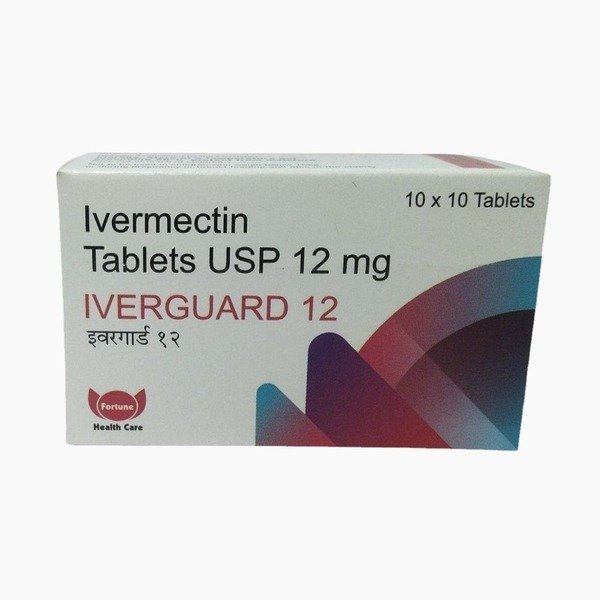
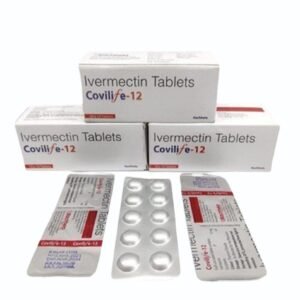
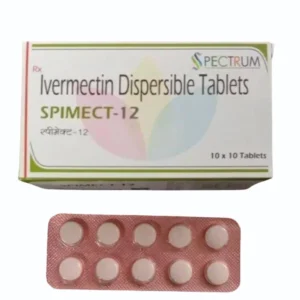
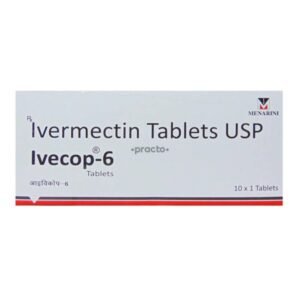
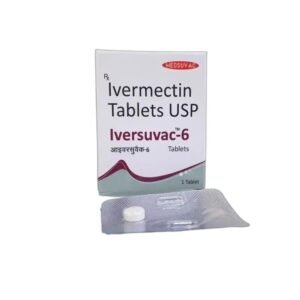
Eliza –
“I’m a believer! This medicine is the real deal. It exceeded my expectations.”
Emily Dakota –
It’s rare to find such dedication. Product Iverguard 12 Mg is flawless. Service is genuine.I’m impressed.